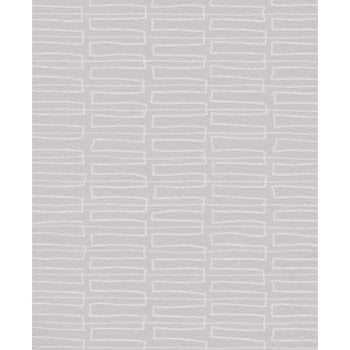The charm of Pihlgren & Ritola’s wallpapers lies in their beautiful patterns but also in the traditional manufacturing method. The wallpapers printed with the old rotary printing press feature slight variation in hue and pattern, which provides an attractive handmade quality. Each roll of Pihlgren & Ritola’s wallpaper is, therefore, a unique individual, keen to adorn your walls.
Poikilo wallpaper, light grey
Pihlgren ja Ritola
Description
The charm of Pihlgren & Ritola’s wallpapers lies in their beautiful patterns but also in the traditional manufacturing method. The wallpapers printed with the old rotary printing press feature slight variation in hue and pattern, which provides an attractive handmade quality. Each roll of Pihlgren & Ritola’s wallpaper is, therefore, a unique individual, keen to adorn your walls.
Product details (5)
- Material
- Finnish paper wallpaper
- Colour
- Light grey
- Width
- 53 cm
- Measurement details
- Length: 10.05 m / roll
- Notes
- Straight match 19 cm
- Product ID
Designer
Lisa Johansson-Pape (1907-1989) graduated as a furniture designer, or as she preferred to say, a furniture drawer, from the Central School of Art and Design (Helsinki) in 1927. After graduation, she worked as a furniture designer at the Kylmäkoski furniture factory. Between 1933-1937 she worked for Friends of Finnish Handicraft as model designer, but also worked as a freelance furniture designer. In 1937, she became Stockmann's office furniture and carpets designer. Her furniture designs were always minimal, concise, and highly functional.
Lisa Johansson-Pape's long career as a lighting designer began in 1942, when she was invited to work at Orno’s lamp factory. Johansson-Pape was also one of the founders of Finland's Lighting Engineering Society. In lighting design, one of her principles was that the shape of the lamp is subordinate to the technological function. Her lamp designs for the most part consisted of metal, glass and acrylic.
She also wrote and lectured on lighting design in Japan and was for many years a teacher of Art and Design. Johansson-Pape was also the artistic director of Friends of Finnish Handicrafts from 1951-1985.
Lisa Johansson-Pape Finnish works were represented in many international exhibitions since the 1930s. In the New York World's Fair of 1939, she furnished part of the Finnish department and at the Milan Triennial in 1951 her lamps and light fixtures received a silver medal as well as gold metal at the 1954 Triennial. In 1960, she made a private exhibition at Stockmann called Light - glass – Metal and later in 1966 she had a joint exhibition with Dora Jung at the Röhsska Museet in Gothenburg.
View all productsReviews (0)
Sustainability
The Product Sustainability Framework, our criteria of sustainable design, helps you find the most sustainable products in our selection. Read below which sustainability criteria this product has met.
Working conditions & labour 8/9
-
Equal opportunities for all employees
-
Commitment to UN Global Compact, fair compensation for all employees
-
Corporate responsibility requirements defined and communicated for suppliers
-
Systematic work for improved inclusion and well-being in the workplace
-
Transparent supply chain
-
Suppliers' compliance to a code of conduct ensured
-
Compliance to the UN Guiding Principles on Business and Human Rights ensured in the supply chain
-
Support for community involvement in the supply chain
-
Direct suppliers audited and certified
Eco-friendly production 8/9
-
Fair and resource-wise water-use in production
-
No incineration or landfilling of returned items
-
No use of endangered species as materials
-
No direct environmental emissions or waste (excl. GHGs) from production
-
The sustainability of direct suppliers' production is addressed and monitored
-
Production and material sourcing that respect biodiversity, animal rights, and natural ecosystems
-
Material-efficient and ecological packaging
-
No potentially harmful chemicals used in own production
-
Positive impact on nature’s well-being through operations that regenerate natural ecosystems
Climate impact 6/8
-
Company's direct greenhouse gas emissions identified and commitment to reduction
-
Product's carbon impact identified and commitment to reduction
-
Guidance on energy- and eco-efficient use of the product
-
Contribution to climate initiatives beyond the brand’s direct operations
-
Low-carbon or compensated transportation
-
100 % renewable energy in own production and operations
-
Carbon footprint of the product calculated and goals set to reduce it
-
Carbon neutral or carbon negative product
Sustainable materials 5/6
-
Sustainable and long-lasting material choices
-
No harmful or hazardous substances
-
Responsible raw material sourcing and production
-
Ecological materials: natural, biodegradable, recyclable or recycled contents
-
Outstanding materials in terms of innovativeness, responsibility, sustainability and circularity: local production or sourcing, 100 % recycled content, C2C-certification etc.
-
Materials suited for circularity: monomaterials, recyclable finishings, renewable or recycled contents etc.
Circular design 4/5
-
High aesthetic quality promoting long-term use of the product
-
Technically durable product design and material choices
-
Design for enduring life-long quality
-
Design and support for product maintenance, repair and upgradability
-
Innovative circular design solutions: circular service system, resale platform, remanufacturing, collection of used products, etc.




